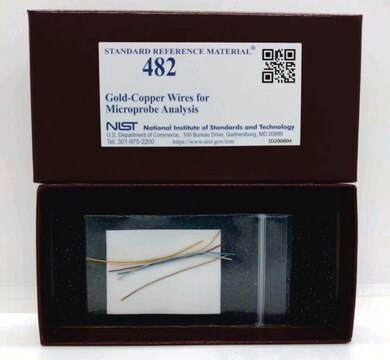326534
Gold
wire, diam. 0.25 mm, ≥99.9% trace metals basis
Faça loginpara ver os preços organizacionais e de contrato
About This Item
Fórmula empírica (Notação de Hill):
Au
Número CAS:
Peso molecular:
196.97
Número CE:
Número MDL:
Código UNSPSC:
12141717
ID de substância PubChem:
NACRES:
NA.23
Produtos recomendados
Nível de qualidade
Ensaio
≥99.9% trace metals basis
Formulário
wire
resistividade
2.05 μΩ-cm, 0°C
Diâmetro
0.25 mm
p.e.
2808 °C (lit.)
pf
1063 °C (lit.)
densidade
19.3 g/mL at 25 °C (lit.)
cadeia de caracteres SMILES
[Au]
InChI
1S/Au
chave InChI
PCHJSUWPFVWCPO-UHFFFAOYSA-N
Aplicação
- Zaleplon in Toxicological Analysis: The development of an LC-MS-MS method to detect Zaleplon along with other benzodiazepines highlights its application in forensic and clinical toxicology, providing essential data for the analysis of Z-drugs in biological samples (Sofalvi et al., 2020).
- Study of Zaleplon′s Solvent Effects: Research on the solvent effects on Zaleplon′s absorption and fluorescence spectra aids in understanding its chemical behavior in different environments, crucial for its use in pharmaceutical formulations and biochemical studies (Divac et al., 2019).
- Zaleplon for Insomnia Treatment via Novel Delivery Systems: The development of orodispersible film and tablets for Zaleplon delivery targets improved patient compliance and rapid onset of action in insomnia treatment, emphasizing its role in sleep disorder management (Manda et al., 2018).
Quantidade
280 mg = 25 cm; 2.8 g = 250 cm
Código de classe de armazenamento
11 - Combustible Solids
Classe de risco de água (WGK)
nwg
Ponto de fulgor (°F)
Not applicable
Ponto de fulgor (°C)
Not applicable
Equipamento de proteção individual
Eyeshields, Gloves, type N95 (US)
Escolha uma das versões mais recentes:
Já possui este produto?
Encontre a documentação dos produtos que você adquiriu recentemente na biblioteca de documentos.
Os clientes também visualizaram
Tae-Sik Cho et al.
Journal of nanoscience and nanotechnology, 13(5), 3711-3714 (2013-07-19)
The crystallization of Au/glass ultrathin films for surface plasmon resonance (SPR) biosensor has been studied using synchrotron X-ray scattering and field emission scanning electron microscope. In films thinner than 30 nm, crystallized Au grains with [111] preferred orientation were formed
Yoon-Chae Nah
Journal of nanoscience and nanotechnology, 13(5), 3470-3473 (2013-07-19)
Au nanoparticles and poly(3-hexylthiophene) (P3HT) composite films were prepared by electrodeposition of Au nanoparticles using pulse-current electrodeposition followed by the spin coating of P3HT and their enhanced electrochromic coloration was investigated. A relatively uniformed Au nanoparticle was obtained by the
Young Min Bae et al.
Journal of biomedical nanotechnology, 9(6), 1060-1064 (2013-07-19)
We report on the enhancement of sensitivity of SPR biosensor by modifying the metal surface. A mixture layer, in which gold and dielectric medium coexist, was simply prepared by increasing the roughness of gold surface deposited onto a glass substrate
Midas touch in cardiology.
Marianna Karamanou et al.
European heart journal, 34(20), 1463-1464 (2013-07-11)
Young Joo Choi et al.
Journal of nanoscience and nanotechnology, 13(6), 4437-4445 (2013-07-19)
Gold nanorods (Au NRs) that absorb near-infrared (NIR) light have great potential in the field of nanomedicine. Photothermal therapy (PTT), a very attractive cancer therapy in nanomedicine, combines nanomaterials and light. The aim of this study was to elucidate the
Global Trade Item Number
| SKU | GTIN |
|---|---|
| 326534-2.8G | 4061833596593 |
| 326534-280MG | 4061833606247 |
Nossa equipe de cientistas tem experiência em todas as áreas de pesquisa, incluindo Life Sciences, ciência de materiais, síntese química, cromatografia, química analítica e muitas outras.
Entre em contato com a assistência técnica
